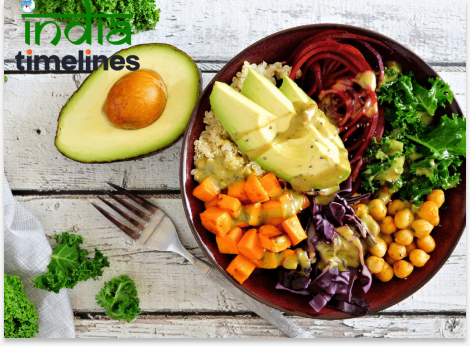
In a world saturated with dietary trends and conflicting health advice, focusing on consistently consuming the healthiest foods can be a game-changer for your overall well-being. While no single food can provide all the nutrients your body needs, a daily diet rich in a variety of nutrient-dense foods can significantly enhance your health. Here’s a comprehensive guide to the healthiest foods you should consider incorporating into your daily routine for balanced nutrition and optimal health.
1. Leafy Greens
Leafy greens such as spinach, kale, and Swiss chard are nutritional powerhouses. They are low in calories but packed with essential vitamins, minerals, and antioxidants.
- Nutrients: High in vitamins A, C, K, and folate. They are also rich in fiber, calcium, and iron.
- Health Benefits: Support bone health, enhance immune function, and improve digestive health.
- Daily Tips: Add a handful of spinach to your smoothies, toss kale into salads, or sauté Swiss chard as a side dish.
2. Berries
Berries like blueberries, strawberries, and raspberries are not only delicious but also incredibly nutritious. They are loaded with antioxidants, vitamins, and fiber.
- Nutrients: High in vitamin C, manganese, and dietary fiber.
- Health Benefits: Improve brain function, support heart health, and have anti-inflammatory properties.
- Daily Tips: Enjoy them as a snack, mix them into yogurt or oatmeal, or blend them into smoothies.
3. Nuts and Seeds
Nuts and seeds, including almonds, chia seeds, and flaxseeds, are excellent sources of healthy fats, protein, and essential nutrients.
- Nutrients: Rich in omega-3 fatty acids, protein, fiber, vitamins, and minerals like magnesium and zinc.
- Health Benefits: Support heart health, improve brain function, and aid in digestion.
- Daily Tips: Sprinkle chia seeds or flaxseeds on your morning cereal, snack on a handful of almonds, or add nuts to salads.
4. Fatty Fish
Fatty fish such as salmon, mackerel, and sardines are renowned for their high omega-3 fatty acid content, which is vital for heart and brain health.
- Nutrients: Excellent source of omega-3 fatty acids (EPA and DHA), high-quality protein, and vitamins D and B12.
- Health Benefits: Lower blood pressure, reduce inflammation, and support cognitive function.
- Daily Tips: Include fatty fish in your weekly meal plan, whether grilled, baked, or added to salads.
5. Whole Grains
Whole grains like quinoa, brown rice, and oats are integral to a balanced diet. They provide sustained energy and essential nutrients.
- Nutrients: High in fiber, B vitamins, iron, magnesium, and antioxidants.
- Health Benefits: Aid in digestion, help control blood sugar levels, and support heart health.
- Daily Tips: Start your day with oatmeal, use quinoa as a base for salads, or swap brown rice for white rice.
6. Avocado
Avocados are incredibly versatile and rich in healthy fats, making them a valuable addition to your diet.
- Nutrients: Packed with monounsaturated fats, fiber, potassium, and vitamins E and C.
- Health Benefits: Promote heart health, improve nutrient absorption, and support skin health.
- Daily Tips: Add avocado slices to salads, spread on toast, or blend into smoothies for a creamy texture.
7. Beans and Legumes
Beans and legumes such as lentils, chickpeas, and black beans are packed with protein and fiber, making them excellent choices for a balanced diet.
- Nutrients: Rich in protein, fiber, iron, and folate.
- Health Benefits: Support digestive health, help manage blood sugar levels, and contribute to heart health.
- Daily Tips: Use beans in soups, salads, or as a meat substitute in various dishes.
8. Cruciferous Vegetables
Cruciferous vegetables like broccoli, Brussels sprouts, and cauliflower are nutrient-dense and offer a range of health benefits.
- Nutrients: High in vitamins C and K, fiber, and antioxidants.
- Health Benefits: Support detoxification, improve digestive health, and may reduce the risk of certain cancers.
- Daily Tips: Steam or roast cruciferous vegetables, add them to stir-fries, or use them in salads.
9. Yogurt
Yogurt, particularly Greek yogurt, is rich in probiotics, which are beneficial for gut health. It’s also a good source of protein and calcium.
- Nutrients: High in protein, calcium, and probiotics.
- Health Benefits: Promote digestive health, support bone health, and boost immune function.
- Daily Tips: Enjoy yogurt as a snack, add it to smoothies, or use it as a base for healthy parfaits with fruits and nuts.
10. Sweet Potatoes
Sweet potatoes are not only delicious but also highly nutritious. They are a great source of complex carbohydrates and essential nutrients.
- Nutrients: High in vitamins A and C, fiber, and potassium.
- Health Benefits: Support eye health, improve immune function, and aid in digestion.
- Daily Tips: Roast sweet potatoes, mash them, or use them in soups and stews.
Incorporating These Foods into Your Daily Diet
To make the most of these healthy foods, aim to include a variety of them in your daily meals. Here’s how you can incorporate them effectively:
- Start with Breakfast: Begin your day with high-fiber foods like oatmeal topped with berries and chia seeds or a smoothie with spinach and avocado.
- Include Veggies in Every Meal: Add leafy greens to your salads, include cruciferous vegetables in stir-fries, and use beans in your soups or stews.
- Snack Smart: Choose nuts, seeds, or yogurt as snacks between meals to keep your energy levels stable and provide essential nutrients.
- Plan Your Proteins: Incorporate fatty fish and legumes into your lunch or dinner to ensure you’re getting high-quality protein and omega-3 fatty acids.
- Experiment with Recipes: Try new recipes that feature these healthy ingredients. For example, make a quinoa salad with black beans and avocado, or bake sweet potato fries as a nutritious alternative to regular fries.
The Benefits of a Diverse Diet
Eating a variety of healthy foods ensures that you receive a broad spectrum of nutrients, each offering unique benefits. A diverse diet helps:
- Prevent Nutrient Deficiencies: Different foods provide different vitamins, minerals, and antioxidants that work together to support overall health.
- Enhance Digestion: A mix of fiber-rich foods promotes healthy digestion and helps prevent constipation.
- Support Long-Term Health: Consuming a wide range of nutrient-dense foods can lower the risk of chronic diseases such as heart disease, diabetes, and certain cancers.
Final Thoughts
Incorporating a variety of nutrient-dense foods into your daily diet is key to achieving and maintaining optimal health. By focusing on foods like leafy greens, berries, nuts and seeds, fatty fish, whole grains, avocados, beans and legumes, cruciferous vegetables, yogurt, and sweet potatoes, you can provide your body with essential nutrients that support overall well-being.
Remember, balance and variety are crucial. While these foods offer significant health benefits, it’s important to enjoy a wide range of nutritious foods and maintain a healthy lifestyle that includes regular physical activity and adequate hydration. Embrace these healthy foods as part of your daily routine, and you’ll be on your way to a healthier, more vibrant you.




























